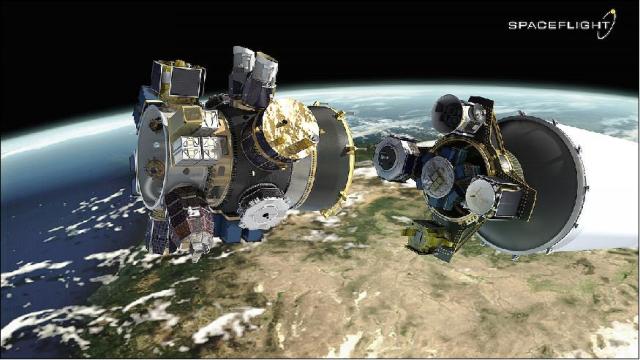
SSO-A mission’s free flyers separating from upper stage of SpaceX’s Falcon-9 rocket – credit Spaceflight
The solar sails on the SSO-A mission “Free Flyer” deployers, launched December 3, 2018 with many amateur radio satellites, are believed to have deployed and may now be quite bright to the naked eye.
Ben Taylor writes:
I represent a team from the University of Surrey in the UK; we have been developing and flying drag de-orbit sails with our first successful demonstration on our InflateSail mission in 2017.
Two dragsail systems were installed on the “Free Flyer” deployers used on the SSO-A launch from December 3, 2018 https://directory.eoportal.org/web/eoportal/satellite-missions/content/-/article/sso-a
The free flyers separated from the launch vehicle and in turn deployed multiple satellites each including Microsats and CubeSats over the course of several hours. The Upper Free Flyer (NORAD ID: 43763) is a large structure at approximately 1,000kg and the Lower Free Flyer is approximately 260kg (NORAD ID: 43760). Each Free Flyer hosts one of our 16m2 aluminised kapton sail which was set to deploy 24 hours after launch.
The systems were standalone isolated systems with no communications so we don’t have any telemetry confirmation. Drag parameters from the TLEs are indicative of a successful deployment, but far from definitive. We’re therefore waiting for them to become optically visible in northern latitudes in the next couple of weeks. Based on the experience with our InflateSail mission, we’d expect these objects to be quite bright to the naked eye if the sails have deployed successfully. InflateSail was 10m2 and (initially) transparent with a +4.2 mag, whereas these sails are 16m2 and metalised so could well flare brightly.
Any observations that could be made by the community of either of these objects would be greatly appreciated and they should make for interesting targets.
We are also the team leading the RemoveDebris mission (NORAD ID: 43510) launched from the ISS last year
https://www.surrey.ac.uk/surrey-space-centre/missions/removedebris
We have a 9m^2 dragsail installed on this mission too which is planned for deployment next month. Similarly, this should make quite a big change to the brightness of the satellite which could make for some interesting observations.
Best Regards,
Ben Taylor,
Guildford, Surrey, UK
Seesat-l mailing list http://mailman.satobs.org/mailman/listinfo/seesat-l
Track of Upper Free Flyer https://n2yo.com/?s=43763&df=1&live=1
Track of Lower Free Flyer https://n2yo.com/?s=43760&df=1&live=1